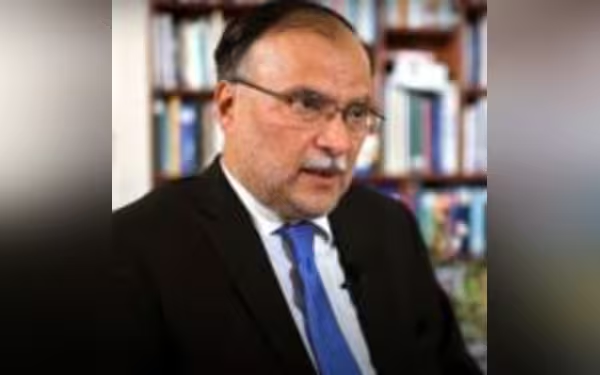Saturday, November 16, 2024 07:44 PM
Ahsan Iqbal Rejects NRO for Imran Khan
- Ahsan Iqbal rules out NRO for Imran Khan.
- Imran Khan must prove innocence in court.
- Call for consistent political accountability emphasized.
 Image Credits: pakobserver
Image Credits: pakobserverAhsan Iqbal firmly rejects any NRO for Imran Khan, emphasizing the need for accountability and legal processes in Pakistan's political landscape.
In a recent statement, Federal Minister for Planning and Development Ahsan Iqbal firmly ruled out the possibility of granting any National Reconciliation Ordinance (NRO) to Imran Khan, the founding chairman of Pakistan Tehreek-e-Insaf (PTI). This declaration comes amidst ongoing discussions in the National Assembly, where the political climate remains tense and charged with accusations and counter-accusations.
Ahsan Iqbal emphasized that Imran Khan must prove his innocence in the courts of law, just as many leaders from the Pakistan Muslim League-Nawaz (PML-N) have done in the past. He pointed out that several senior PML-N leaders have faced imprisonment and have had to clear their names through legal processes. This statement serves as a reminder of the political struggles that have characterized Pakistan's history, where leaders often find themselves embroiled in legal battles.
During the National Assembly session, Iqbal responded to remarks made by Leader of the Opposition Omar Ayub Khan. He highlighted a significant inconsistency in the PTI's approach to accountability. Iqbal noted that while PTI leaders previously demanded transparency and accountability from PML-N members, they now seem reluctant to provide the same level of scrutiny regarding their own actions, particularly in relation to corruption cases involving substantial sums, such as the infamous 190 million pounds.
“PTI leaders should follow those principles and scales which they set for the then opposition members (PML-N) during their tenure,” Iqbal stated, underscoring the need for consistency in political accountability. This call for fairness and adherence to principles resonates with many citizens who are weary of political double standards.
As the political landscape continues to evolve, the demand for accountability remains a crucial issue for the citizens of Pakistan. The insistence on legal processes and the rejection of shortcuts like the NRO reflect a growing desire among the populace for a transparent and just political system. It is essential for all political leaders to recognize that the rule of law must prevail, and that accountability is not just a demand for others, but a responsibility they must also uphold.
Ahsan Iqbal's statements serve as a significant reminder of the ongoing challenges within Pakistan's political framework. As the nation grapples with issues of corruption and accountability, it is imperative for leaders to lead by example and ensure that justice is served fairly and equitably. The future of Pakistan's democracy hinges on the commitment of its leaders to uphold the principles of justice and transparency.













